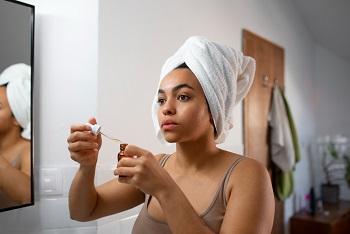How Skin Microbiome Influences Glowing Skin
Our skin is not just a protective barrier, it is home to a living ecosystem of microscopic organisms. These include bacteria, fungi, and viruses that naturally inhabit the skin’s surface, forming what is known as the skin microbiome [1]. While the thought of bacteria living on our faces may seem concerning, research has shown that most microbes are either harmless or beneficial.
When in balance, they help to protect us from infections, reduce inflammation, and maintain a healthy skin barrier, all of which contribute to clearer, more radiant skin.
6 Factors that Affect Skin Microbiome Balance
Each individual’s skin microbiome is unique, influenced by genetics, age, skin type, and environmental exposure. Notably, different areas of the face harbour distinct microbial communities. For example, oilier regions such as the forehead and nose typically support higher concentrations of acne-associated bacteria, and drier areas are more likely to harbour a wider range of microorganisms [2].
Skin Disorders
These microbes do more than passively occupy the skin; they interact with the immune system and play a vital role in keeping the skin calm, hydrated, and healthy. However, when this balance is disturbed, it can contribute to skin problems such as acne, eczema, or increased sensitivity [3].
In the case of acne, studies have found that affected individuals often show reduced microbial diversity and a higher presence of inflammatory strains of Cutibacterium acnes [4]. This imbalance can lead to clogged pores, excessive oil production, and inflamed spots. Similarly, eczema flare-ups are frequently associated with an overgrowth of Staphylococcus aureus [5].
Also Read;
Skin type
Your skin type also influences your microbiome. Oily skin provides a warm, moist environment that encourages the growth of oil-loving microbes, potentially increasing the risk of acne. In contrast, dry skin may struggle to support a robust microbial community due to reduced moisture levels, leaving it more vulnerable to irritation and environmental stress. Each skin type, therefore, requires tailored microbiome support to maintain balance and resilience.
Also Read;
Skincare Products and Abuse of Antibiotics
Various daily habits can influence the health of your skin microbiome. Over-washing with harsh soaps or alcohol-based products can strip away harmful and beneficial microbes, disrupting the skin’s natural equilibrium [6]. Similarly, the overuse of antibiotics, often prescribed for acne, can reduce microbial diversity and may even worsen long-term skin health.
pH Levels
On the other hand, gentle skincare routines that maintain the skin’s natural pH (around 5.5) can help support microbial health. Using pH-balanced, non-stripping cleansers and fragrance-free moisturisers helps protect the skin barrier and provides a favourable environment for beneficial bacteria to thrive [7].
Diet and Environment
Lifestyle factors such as diet and environment also play a significant role. Diets high in sugar and processed foods can increase systemic inflammation, potentially exacerbating skin issues like acne [8]. In contrast, a diet rich in antioxidants, omega-3 fatty acids, and fermented foods may help reduce inflammation and support a healthier microbiome [9].
Gut Health
There is also a growing interest in the gut-skin axis, which suggests that a balanced gut microbiome can positively influence skin health by lowering systemic inflammation [10].
Additional Read;
In response to these insights, many skincare products now include prebiotics, probiotics, and postbiotics designed to support the skin’s microbial ecosystem. Prebiotics act as food for beneficial bacteria, with common ingredients including inulin and oat extract. Probiotics refer to live or fermented bacterial extracts that aim to restore microbial balance.
While maintaining live bacteria in skincare products poses challenges, studies have shown that some probiotic creams and serums can reduce acne and skin inflammation [11]. Microbiome-friendly products offer a gentler and more sustainable alternative to conventional treatments for those with sensitive or acne-prone skin.
How to Care for the Skin Microbiome
Caring for your skin microbiome does not require expensive or complicated routines. Often, the best approach is a simple, balanced one:
- Avoid over-cleansing
- Choose mild and non-irritating skincare products
- Moisturise regularly
- Protect your skin from excessive sun exposure
- Eat a well-rounded diet.
If your skin is inflamed or breaking out, consider whether your microbiome might be out of balance rather than resorting immediately to antibacterial solutions. A skincare approach that respects the microbiome aligns more closely with the skin’s natural processes.
Also Read;
In Conclusion
Rather than viewing bacteria as harmful invaders to be eliminated, we increasingly recognise them as essential allies in maintaining healthy skin. These microscopic organisms play a role in reinforcing the skin’s barrier, regulating inflammation, and preserving overall balance within the skin’s ecosystem. When the microbial environment is supported and nurtured, it can enhance the skin’s resilience, reduce the likelihood of common conditions such as acne or sensitivity, and contribute to a naturally radiant complexion. Supporting the skin’s microbiome may be one of the most effective and sustainable strategies for achieving long-term skin health and natural beauty.
By: Dr. Bita Abdi
Edited by: Damilola Elewa









Comments (0)